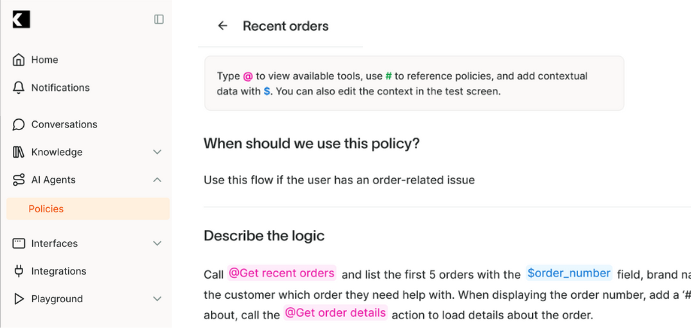Ingredients
The systems used by this policy include EasyPost, Zendesk, and Kodif.
What are AI Policies?

At Kodif, we’re excited to announce the launch of Policies—a powerful, dynamic solution designed to revolutionize the way CX managers handle customer support. Unlike traditional flows, which are rigid and complex, Policies empower non-technical users to create and manage customer interactions with ease. Written in natural language, Policies make it simple to define and refine customer experiences without needing to rely on complicated flowcharts or scripting. This approach is not only user-friendly but also self-serve, enabling CX teams to quickly translate existing Standard Operating Procedures (SOPs) into automation, saving valuable time and resources.
The flexibility of Kodif Policies ensures that businesses can offer personalized, context-driven support while continuously improving customer experiences. With Policies, you can experiment with different strategies to optimize outcomes such as CSAT, revenue, and retention—all without the need to rebuild complex workflows. Whether it’s automating routine interactions or testing new approaches for high-stakes scenarios, Policies provide a scalable, adaptable solution that aligns with your business goals. While flows still have their place in sensitive, high-risk situations, Policies offer an agile alternative that helps businesses innovate faster and deliver exceptional, tailored experiences at scale.
“WISMO” Ticket Type Explained
WISMO stands for “Where Is My Order?” and is a common ticket type in customer support, especially for e-commerce and retail businesses. These tickets arise when customers inquire about the current status, location, or expected delivery time of their orders. Efficient management of WISMO tickets is vital for maintaining customer satisfaction and trust. By quickly addressing these inquiries, businesses can reduce customer anxiety and demonstrate transparency in their operations. Automating responses to WISMO tickets can significantly alleviate the workload on support teams, allowing them to focus on more complex issues that require human intervention.
Which Platforms Does This AI Policy Work On?
This AI policy is designed to work seamlessly on EasyPost, Zendesk, and Kodif. Kodif also integrates with all other major platforms, providing a flexible solution for various customer support environments.
When Should I Use This Policy?
This policy should be employed when customers inquire about the status of their orders. By utilizing this policy, businesses can automate the response process, ensuring quick and accurate information delivery to customers. Here’s a breakdown of the policy logic:
- Ask for the User’s Email Address
- Use @geteasypost_account_details to verify if the user with that email address exists in EasyPost.
- If the email address is not found, request a valid email address.
-
If the email address is still not found, route it to an agent for further investigation.
-
Display Recent Orders
- Use @geteasypost_orders to retrieve the user’s recent orders.
- Display the list of recent orders and ask the user which specific order they would like to inquire about.
-
If the order is not found, route to an agent for further investigation.
-
Check Order Status
- For the selected order, retrieve the shipping status using @easypost_order_details(order_id: str).
- If “Approved”, inform the customer that the order was approved and is waiting to be processed.
- If “Processing”, inform the customer that the order was processed and is waiting to be shipped.
- If “Pending Shipment”, inform the customer that the order is pending shipment and provide a shipment date.
- If “Shipped”, inform the customer that the order was shipped and is in transit, providing the tracking number.
- If “In Transit”, use @easypost_order_details to check if the order is within the estimated delivery date. If yes, inform the customer of the expected delivery date. If no, inform the customer of the delay and transfer the request to an agent for investigation.
- If “Delivered”, confirm with the customer if the order was delivered. If not, escalate the issue to an agent.
- If “Canceled”, inform the customer that the order was canceled.
Policy Logic
This AI policy is particularly useful when handling WISMO inquiries, providing a streamlined approach to managing order status requests. By automating these processes, businesses can ensure efficient and accurate responses to customer inquiries. The logic is simple: type @ to view available tools, use # to reference policies, and add contextual data with $. You can edit the context in the test screen to tailor the policy further.
Example Policy
When addressing WISMO tickets, the policy utilizes EasyPost and Zendesk to automate the process. Here’s an example policy logic:
- Ask for the User’s Email Address
- Use @geteasypost_account_details to check if the user with that email address exists in EasyPost.
- If the email address is not found, ask for a valid email address.
-
If the email address is still not found, route it to an agent for further investigation.
-
Display Recent Orders
- Use @geteasypost_orders to retrieve the user’s recent orders.
- Display the list of recent orders and ask the user which specific order they would like to inquire about.
-
If the order is not found, route to an agent for further investigation.
-
Check Order Status
- For the selected order, retrieve the shipping status using @easypost_order_details(order_id: str).
- If “Approved”, inform that the order was approved and is waiting to be processed.
- If “Processing”, inform that the order was processed and is waiting to be shipped.
- If “Pending Shipment”, inform that the order is pending shipment and provide a shipment date.
- If “Shipped”, inform that the order was shipped and is in transit, providing the tracking number.
- If “In Transit”, use @easypost_order_details to check if the order is within the estimated delivery date. If yes, inform the order is in transit and provide the expected delivery date. If no, inform the customer of the delay and transfer the request to an agent for investigation.
- If “Delivered”, confirm with the customer if the order was delivered. If not, escalate the issue to an agent.
- If “Canceled”, inform that the order was already canceled.
This example illustrates how an automated system can manage WISMO inquiries efficiently, reducing the workload on customer service teams and ensuring customer satisfaction.


